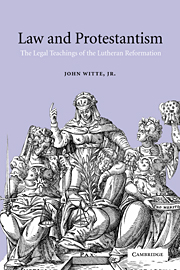Book contents
- Frontmatter
- Contents
- List of illustrations
- Foreword by Martin E. Marty
- Acknowledgments
- List of Abbreviations
- Introduction
- 1 Canon law and civil law on the eve of the Reformation
- 2 Loving thine enemy's law: The Evangelical conversion of Catholic canon law
- 3 A mighty fortress: Luther and the two-kingdoms framework
- 4 Perhaps jurists are good Christians after all: Lutheran theories of law, politics, and society
- 5 From Gospel to Law: The Lutheran reformation laws
- 6 The mother of all earthly laws: The reformation of marriage law
- 7 The civic seminary: The reformation of education law
- Concluding reflections
- Bibliography
- Index
1 - Canon law and civil law on the eve of the Reformation
Published online by Cambridge University Press: 17 November 2009
- Frontmatter
- Contents
- List of illustrations
- Foreword by Martin E. Marty
- Acknowledgments
- List of Abbreviations
- Introduction
- 1 Canon law and civil law on the eve of the Reformation
- 2 Loving thine enemy's law: The Evangelical conversion of Catholic canon law
- 3 A mighty fortress: Luther and the two-kingdoms framework
- 4 Perhaps jurists are good Christians after all: Lutheran theories of law, politics, and society
- 5 From Gospel to Law: The Lutheran reformation laws
- 6 The mother of all earthly laws: The reformation of marriage law
- 7 The civic seminary: The reformation of education law
- Concluding reflections
- Bibliography
- Index
Summary
In his 1520 manifesto, To the Christian Nobility of the German Nation Concerning the Reform of the Christian Estate, Martin Luther described the law of Germany as a “wilderness” of confusion. Confronted by the masses of “rambling and farfetched” laws that prevailed in his day, Luther threw up his hands in frustration as he sought to map out appropriate legal reforms. He scratched a couple of quick lines about the superiority of civil law to canon law, and of territorial law to imperial law. He spoke of the need to tailor laws to the “gifts and peculiar characteristics” of local polities. But then, uncharacteristically, Luther gave up. He recommended simply that “wise rulers, side by side with Holy Scripture, would be law enough,” and expressed hope that others would give “more thought and attention to the matter.” Luther himself would soon return to the matter of law reform with a vengeance, but for the moment his mind was on more pressing questions – not least the growing perils to his own body and soul occasioned by the papal bull calling for his excommunication.
Luther had ample reason to be frustrated in his attempts to take the measure of the German law of his day. In 1520, the German-speaking lands of the Holy Roman Empire had no fewer than 364 registered polities, most with their own local legal systems.
- Type
- Chapter
- Information
- Law and ProtestantismThe Legal Teachings of the Lutheran Reformation, pp. 33 - 52Publisher: Cambridge University PressPrint publication year: 2002



